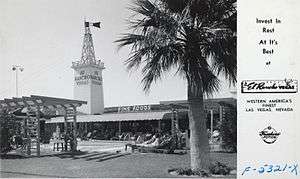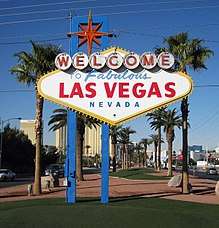El Rancho Vegas
| El Rancho Vegas | |
|---|---|
.jpg) | |
| Location | Las Vegas, NV 89109 |
| Address | 2500 Las Vegas Blvd. |
| Opening date | April 3, 1941 |
| Closing date | June 17, 1960 (as El Rancho Vegas) |
| Theme | Western |
| No. of rooms | 220 |
| Signature attractions | The Opera House |
| Notable restaurants | The Opera House, Chuck Wagon Buffet, Nugget Nell Lounge, Stage Door Steakhouse |
| Casino type | Land-based |
| Owner | Beldon Katleman |
| Architect | Wayne McAllister |
| Renovated in |
1947 1964 |
| Coordinates | 36°08′29″N 115°09′38″W / 36.141357°N 115.160456°WCoordinates: 36°08′29″N 115°09′38″W / 36.141357°N 115.160456°W |
El Rancho Vegas was a hotel and casino on the Las Vegas Strip. It was located at 2500 Las Vegas Boulevard, at the southwest corner of Las Vegas Boulevard and Sahara Avenue,[1] in what is now known as Winchester, Nevada. The El Rancho Vegas opened on April 3, 1941. Until 1942, it was the largest hotel in Las Vegas with 110 rooms. On June 17, 1960, the El Rancho Vegas' main building, including the casino and restaurants, was destroyed in a fire. Later in the 1960s, the property operated as a non-gaming motel known as the El Rancho Vegas Motor Inn. By 1979, the buildings had been demolished or removed. In 1982, the El Rancho Hotel and Casino – formerly known as the Thunderbird and later as the Silverbird – opened across the street from the former site of the El Rancho Vegas, creating some confusion.
History

In 1940, James Cashman, a businessman, asked Thomas Hull, the owner of the El Rancho hotels, to build a chain in Las Vegas. Hull saw the potential of the resort, as he saw all the out-of-state license plates during a visit to the resorts potential site.[2] Construction of the El Rancho Vegas began in 1940, and the resort opened on April 3, 1941.[3] El Rancho Vegas was the first resort on the Las Vegas Strip.[4] It was designed by architect Wayne McAllister, who constructed the resort with a Spanish-style exterior with a cowboy/frontier-styled interior for $500,000.[5] El Rancho Vegas offered horseback riding, a large swimming pool, and top shows in its theater called the Opera House.[6] When it opened, El Rancho Vegas's dining room was the largest in Las Vegas.[5] The casino offered four table games : two blackjack tables, one roulette table, and one craps table—and seventy slot machines.[7]
In December 1944, William Wilkerson leased the El Rancho Vegas from then owner Joe Drown for six months. Wilkerson paid Drown $50,000 for the six-month lease.[8] Wilkerson would later go on to build The Flamingo Hotel. In September 1945, El Rancho Vegas was sold for $1.5 million to Los Angeles businessman Walter Guzzardi.[9] The resort went through several changes of ownership before Beldon Katleman, who received a share of ownership upon the death of his uncle, Jake Katleman, in 1947, bought out the remaining shareholders and became the proprietor of record.[5] Katleman used $750,000 to improve the resort, and El Rancho Vegas became the largest casino in Nevada.[5] Gloria LeRoy, early in her career, headlined Nouvelle Eve, a Parisian cabaret show import, from 1951 thru 1952.[10][11]
.jpg)
Shirley Bassey made her American stage debut here in 1957.[12] Paul Newman and Joanne Woodward were married at the El Rancho Vegas in 1958. The wedding was held in the suite of (and completely paid for by) the casino's owner at the time, Beldon Katleman. Stripper Candy Barr was headlining at El Rancho Vegas in 1959 when she was arrested by the FBI after her appeal on a marijuana conviction originating in Texas was rejected by the US Supreme Court.[13]
Big entertainers who performed regularly at the El Rancho included Sophie Tucker (a mainstay), Jimmy Durante, Julius LaRosa, comedians Joe E. Lewis and Buddy Hackett, opera star Roberta Sherwood, actresses Jane Russell, Eartha Kitt, Rita Moreno, Gloria DeHaven and even Zsa Zsa Gabor.
Fire and closure
On June 17, 1960, a fire broke out in the El Rancho's main building, which contained the casino, A Chuck Wagon buffet, the Nugget Neil Cocktail Lounge, the Stage Door Steak House, the Opera House dining room and showroom, and offices.[14] There were no deaths or injuries,[15] but the building was destroyed.[14] It was initially reported after the fire that Katleman wanted to rebuild the El Rancho with a grander style than before, but such plans never materialized.[14]
In March 1964, Alfred Hotels, Inc. announced that it had leased the property, which would be renamed as the El Rancho Vegas Motor Inn. Refurbishments were underway at that time, including remodeling of the swimming pool.[16] By March 1965, a museum known as Wax Museum operated on the same property as the El Rancho Vegas Motor Inn.[17] The El Rancho Vegas struggled financially as a non-gaming motel,[4][14] leading Katleman to put the property up for sale in the late 1960s.[14] Howard Hughes negotiated a $7.5 million deal to purchase the property, and Katleman initially agreed before later raising the purchase price. A two-year court battle began in 1968 as Hughes and Katleman fought over the initial purchase agreement. On May 20, 1970, Hughes and Katleman settled the case after Hughes agreed to pay $8.5 million for the property.[14] The buildings were then used as a storage facility before being demolished.[4] The property was vacant as of 1979. Some of the buildings were moved to Old Vegas, an Old West amusement park outside of Henderson, Nevada.[14]
The Hilton Grand Vacations Club timeshare opened on the southern end of the land in 2004.[4][5] In 2007, MGM Mirage purchased the remainder of the land and announced plans for a resort that would be jointly developed with Kerzner International Resorts.[4] Ultimately, MGM opened its MGM Resorts Festival Grounds on the property in 2015.
Notes
- ↑ "MGM Mirage purchase includes El Rancho site". Las Vegas Review-Journal. p. 3B.
|access-date=requires|url=(help) - ↑ Moehring & Green (2005), p. 109
- ↑ "The First Light of the Strip". Las Vegas Review-Journal. June 20, 2009. p. B2.
- 1 2 3 4 5 "History: The El Rancho Vegas Story". University of Nevada, Las Vegas. February 12, 2009. Retrieved July 8, 2012.
- 1 2 3 4 5 Burbank, October 6, 2010. "El Rancho Vegas". Online Nevada Encyclopedia. Retrieved July 8, 2012.
- ↑ Morgan, Kitty (November 27, 1993). "Las Vegas Destroys Its 'Past' As New Mega-Resorts Rise, Buildings of the '40s and '50s are Tumbling Down". The Toronto Star. p. F17.
- ↑ "Casino Gambling at El Rancho Vegas". University of Nevada, Las Vegas. February 12, 2009. Retrieved July 9, 2012.
- ↑ "Rancho Vegas Hotel Leased". Los Angeles Times. March 28, 1946. p. 1.
- ↑ "El Rancho Vegas Brings $1,500,000". Los Angeles Times. September 13, 1945. p. A1.
- ↑ "Gloria Leroy - Autograph Resume Signed - Autographs & Manuscripts - HistoryForSale Item 304882". historyforsale.com. Retrieved April 20, 2017.
- ↑ "Gloria Leroy - Autograph Letter Signed 06/01/1969 - Autographs & Manuscripts - HistoryForSale Item 316768". historyforsale.com. Retrieved April 20, 2017.
- ↑ Williams (2010), p. 154
- ↑ "Candy Barr Gets Prison Terms". The Pittsburgh Press. February 16, 1959. p. 19. Retrieved July 9, 2012.
- 1 2 3 4 5 6 7 Stamos, George. "The El Rancho Vegas story". University of Nevada, Las Vegas. Retrieved April 12, 2018.
- ↑ "The El Rancho Vegas Fire". Clark County Fire Department. August 1, 2011. Retrieved July 8, 2012.
- ↑ "Lease El Rancho Vegas Property". March 8, 1964. Retrieved April 12, 2018 – via NewspaperArchive.com.
- ↑ "Wax Museum Gives Aid To School Stadium Fund". Las Vegas Sun. March 3, 1965. Retrieved April 12, 2018 – via NewspaperArchive.com.
References
Further reading
External links
| Wikimedia Commons has media related to El Rancho Vegas. |
